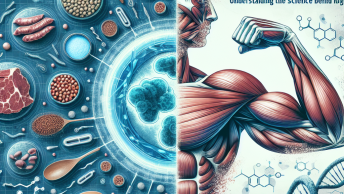10 Essential Nutritional Tips for a Healthier Lifestyle
Maintaining a healthy lifestyle begins with understanding nutrition. In a world where we’re constantly bombarded with dietary trends and misinformation, it’s crucial to sift through the noise to identify what really contributes to one’s health and well-being. Whether you’re seeking to lose weight, boost energy levels, or simply live a better life, nutrition holds the key. Here are ten essential nutritional tips that can revolutionize your approach to eating and health.
1. Understand the Basics of Macros
Macronutrients, or "macros," are the nutrients that provide us with energy: carbohydrates, proteins, and fats. A balanced intake of these nutrients is essential for bodily functions. Carbohydrates are the primary energy source, proteins are vital for repair and muscle growth, and fats are crucial for hormone production and cell structure. Tailor your macro intake to align with your individual health goals and activity levels.
2. Prioritize Whole Foods
Whole foods, such as fruits, vegetables, whole grains, and lean proteins, are minimally processed, offering the highest nutritional value. These foods are rich in essential nutrients and free from unnecessary additives and preservatives. Opt for whole foods over processed snacks to ensure you’re filling your body with valuable nutrients.
3. Hydrate, Hydrate, Hydrate
Water is vital for every cell, tissue, and organ in the body. From regulating temperature to lubricating joints and facilitating digestion, water’s role cannot be overstated. Aim to drink at least eight 8-ounce glasses of water daily, and adjust intake based on activity level and climate.
4. Don’t Fear Healthy Fats
The notion that all fats are harmful has been debunked. Healthy fats, such as those found in avocados, nuts, seeds, and olive oil, are essential for brain health, hormone balance, and nutrient absorption. They also provide a long-lasting energy source. Incorporate healthy fats into your diet to support overall well-being.
5. Embrace Dietary Fiber
Fiber is essential for digestive health, helping regulate the body’s use of sugars and keeping hunger levels in check. Foods rich in fiber, such as beans, whole grains, fruits, and vegetables, contribute to a healthy digestive system. Increasing your fiber intake can reduce the risk of chronic diseases, such as heart disease and type 2 diabetes.
6. Plan Your Meals
Meal planning can significantly impact your nutritional success by minimizing unhealthy choices made out of convenience. Taking the time to prepare meals in advance ensures that you have balanced, nutritious options readily available. Consider incorporating a variety of foods from all food groups to maintain a well-rounded diet.
7. Mindful Eating
Mindful eating involves paying full attention to the experience of eating and drinking, both inside and outside the body. It helps you become more in tune with your hunger and satiety cues, encouraging better food choices and enjoyment of your meals. Focus on savoring every bite, slowing down, and appreciating the textures and flavors of your food.
8. Become Label Savvy
Learning how to read and understand food labels is a valuable skill in today’s world of processed foods. Ingredients are listed by quantity, from highest to lowest, so it helps in identifying overly processed items. Look for products low in added sugars, sodium, and unhealthy fats. Recognizing these details will help you make more informed dietary choices.
9. Keep a Consistent Eating Schedule
Having a consistent eating schedule helps regulate your body’s internal clock. Try to eat around the same times each day to maintain energy levels, improve digestion, and prevent unhealthy snacking. Consistency in meal timing supports better coordination of the body’s physiological processes, contributing to a healthier lifestyle.
10. Seek Professional Guidance
Navigating the world of nutrition can be overwhelming due to the abundance of information and often conflicting dietary advice. Consulting a registered dietitian or nutritionist can provide personalized guidance based on your unique needs and health goals. They can assist in developing a sustainable eating plan that emphasizes long-term health.
For those eager to delve deeper into nutrition and perhaps seek further resources to complement these tips, additional guidance can be invaluable. Whether you’re looking to expand your knowledge base or seek specific dietary advice, consider exploring options that offer detailed insights and support. Click Here to learn more about advanced nutritional strategies tailored to optimize your health and well-being.
Incorporate these nutritional tips into your daily routine to pave the way for improved health, greater energy levels, and a better quality of life. Remember, nutrition is not just about dieting; it’s a lifestyle choice that empowers you to live your fullest life. With the right guidance and resources, maintaining a nutritious diet can be a rewarding and transformative experience.






